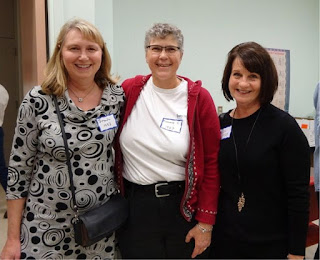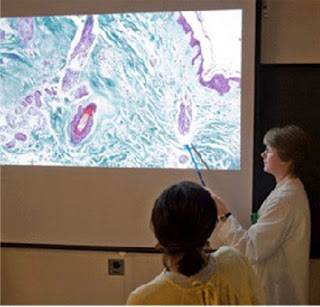Updated: 31 May 2021
INTRODUCTION
The idea for the blog was stimulated by news of an American clinical laboratory scientist being fired after she had been infected with COVID-19 and was recovering from 'long haul' COVID-19, even though she had worked for the employer (Community Hospitals of Central California) for 33 years. The news item came about because she has sued the employer for wrongful dismissal.(Further Reading)
The blog's title derives from a 1969 song by Creedence Clearwater Revival.
PERSONAL ANECDOTES
First, please note that I had a minor disability (suffered from acute lower back pain attacks) when I first joined UAlberta's Medical Laboratory Science first as a lecturer and clinical instructor for the hospital's transfusion service and later became an assistant professor. Was a candidate for surgery but the Drs decided to treat it conservatively, for which I'm grateful.
The attacks were severe and my colleagues kindly would pick me up and drive me to work. I managed with a 2-wheel folding walker, and by taking mega doses of the pain killer ibuprofen, a nonsteroidal anti-inflammatory drug (NSAID).
The university's Faculty of Medicine/Department of Laboratory Medicine and Pathology always supported me, even when I had to take extended time off. What they did was designate a hematopathologist resident to give my classes until I could return. One who helped is now in a senior position.
NOTE: If you've read this blog before you will know I'm a contrarian.
Over 36 years working as a medical laboratory technologist and educator, I've seen only two medical lab technologists who ever faced being fired.
#1. One was when I worked at Canada's then blood supplier (Canadian Red Cross Blood Transfusion Service, also a transfusion service for the entire city) in Winnipeg. It failed. A compulsory Dr. exam was needed after you were hired, and the Dr. said a girl with deformed hands due to a medical condition could not perform her duties, as we then largely worked manually, did a lot of pipetting by hand. Staff saw she could do the work and I decided to get every lab worker to sign a petition saying she could do the work. She wasn't fired and went on to work many years for the organization, including becoming a supervisor.
#2. The second I heard about as an educator and it disturbed me. I've decided not to give many details to respect her privacy. I knew her well when she worked in a hospital transfusion service and was helping her get her ART (Advanced Registered Technologist), then offered by the CSMLS. After losing her license to practice as a med lab technologist she became a medical lab aide and to me didn't deserve her fate. I wish I had been able to help her at the time.
SUMMARY
I've read several news items about the story and also the lawsuit , which is available online. What follows is my interpretation of the basic facts of the case. Yours may be different. Most is from the lawsuit, some from news items. The Plaintiff asked for a jury trial.
1. Plaintiff began working for Defendant, Employer, on or about 1 July 1987 as Clinical Lab Scientist. She received good performance reviews and salary increases and was not subject to discipline for her job performance over the more than 30 years of her employment.
2. Plaintiff suffers from several medical conditions including diabetes, cardio-pulmonary disease and traumatic brain injury. Defendant, Employer, is aware of Plaintiff’s medical conditions.
On several occasions when Plaintiff had to take time off work due to illness, Defendant, Employer, subjected her to discipline based on her attendance.
3. In mid-April Plaintiff contracted COVID-19. Her health care provider put her on medical leave for about six weeks.
4. Plaintiff’s health care provider suggested that she request intermittent medical leave due to her continued illness combined with her underlying medical conditions. Plaintiff requested the appropriate paperwork from Defendant, Employer’s leave of absence department. However, Plaintiff’s supervisor told her “you better not” referring to Plaintiff’s request for leave. In addition to this threat from her supervisor, Plaintiff was shunned by her supervisor and coworkers.
5. Within the year last past, without excuse, justification or privilege, agents of Defendant, Employer, including but not limited to supervisor Carol Kelley, published and republished, orally and in writing to third persons, including prospective employers of Plaintiff and other persons who are not parties to this action, the false and defamatory statements about Plaintiff, stating as matters of fact that, among other things: Plaintiff violated company policies; and Plaintiff deserved to be terminated.
My comment: Wow, they spoke to prospective employers and under which circumstances? My experience in Alberta, Canada is when FOIP (Freedom of Information and Protection of Privacy) became law, prospective employers who were not listed in an applicant's application for employment, would not comment except to say the person worked there.
6. The Causes for Action in the lawsuit, which all relate to violations of Government Code §12940:
1) Discrimination Based on Medical Condition, Disability and/or Perceived Disability in Violation of ...
2) Failure to Accommodate Disability in Violation of ...
3) Failure to Engage in a Timely, Good Faith, Interactive Process To Determine Effective Reasonable in Violation of ...
“It shall be an unlawful employment practice . . . For an employer. . . to fail engage in timely, good faith, interactive process with the employee . . . to determine effective reasonable accommodations . . .”
Defendant, Employer, knew of Plaintiff’s medical condition and her need for accommodation which consisted of additional medical leave. Yet, Defendant, Employer, failed to accommodate Plaintiff and ignored her requests for accommodation. Defendant, Employer, refused to explore any options to accommodate Plaintiff but, instead, subjected her to unjust discipline and terminated her employment. Accommodation of Plaintiff would not have caused Defendant, Employer, any undue hardship, significant difficulty or expense.
4) Failure to Prevent Discrimination and Discrimination Based on Medical Condition, Disability and/or Perceived Disability in Violation of...
5) Retaliation for Requesting Accommodation in Violation of...
6) Retaliation for Exercising Rights Under California Family Rights Act in Violation of 2 C.C.R. §11094
7) Wrongful Termination in Violation of Public Policy
8) Defamation
Within the year last past, without excuse, justification or privilege, agents of Defendant, Employer, including but not limited to Carol Kelley, published and republished, orally and in writing to third persons, including prospective employers of Plaintiff and other persons who are not parties to this action, the false and defamatory statements about Plaintiff, stating as matters of fact that, among other things: Plaintiff violated company policies; and Plaintiff deserved to be terminated.
The statements made by Defendants and their agents were and are false and constitute defamation on their face in that they communicate to third persons as matters of fact that Plaintiff was a problematic and poorly performing employee who deserved to be terminated from her job. This constitutes defamation per se as false statements tending to injure Plaintiff in her profession.
Plaintiff asks for the following:
- For general damages in excess of the jurisdictional minimum of this Court, according to proof;
- For special damages according to proof;
- For exemplary punitive damages, according to proof;
- For interest on the amount of losses incurred in earnings, deferred compensation and other employee benefits at the prevailing rate;
- For reinstatement to her job with Defendant, Employer;
- For costs of suit, including reasonable attorneys’ fees; and
- For such other and further relief as the Court may deem just and proper.
FOR FUN
Had difficulty choosing a song for this blog but settled on the following, as I wonder how many 'long haul' COVID-19 folks will suffer a similar fate of the med technologist in this blog.
- Bad Moon Rising (Creedence Clearwater Revival)
I see the bad moon a-rising / I see trouble on the way...
FURTHER READING
















